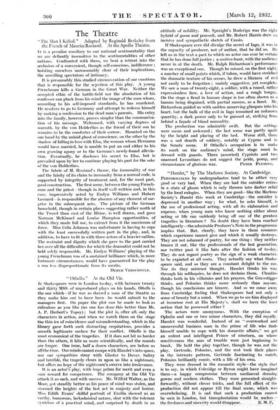"Hamlet," by The Marlowe Society. At Cambridge. PEROORMANCES by undergraduates
tend to be either very Oiod or very bad. When they are bad the outsider retires in a state of gloom Which is only thrown into darker relief by the local eulogies. When they are good—like the Marlowe Society's Hamlet this week at Cambridge7-the outsider is depressed in another Way; f6r what, he asks himself, is the use of profeSsional acting, with all its elaboration and expense, when young men who know nothing either about acting or life can suddenly bring off one of the greatest tragedies in literature ? No doubt they have 'been coached intelligently—the admirable Producer's Note in the programme implies that. But, clearly, they have in them resources which experience cannot give and which it usually destroys. They are not ashamed of poetry, for one thing : they neither brazen it out, like the professionals of the last geneiation. nor twitter past it like bats after the fashion of to-day. They do not regard poetry as the sign of a weak character, to be expiated at all costs. They actually say what Shake- speare said, and so they are a constant delight to the ear, Nor do they mistrust thought. Hamlet thinks his way through his soliloquies, lie does not declaim thelia. Claudius thinks both in his villainies and his prayers, the Gravedigger thinks, and Polonius thinks more seriously than anyone, though his conclusions are bizarre. And so we conic away from Cambridge feeling that Shakespeare had not only a sense of beauty but a mind. When we go to see hiin displayed at immense cost at His Majesty's, shall we have the least notion that he possessed either ?
The actors were anonymous. With the exception of Ophelia and one or two minor characters, they. did royally. Hamlet was wonderful. Instead of an ".overworked and unsuccessful business num in the prime of life. who finds himself unable to cope with his domestic affairs,'.' we got an ardent and intelligent , Prince of nineteen, on whose sensitiveness the. seas of trouble were just beginning to .break. He held the play. together, though lie was not the play. Gertrude, Polonius, and the rest took their. places in the intricate pattern, Gertrude fascinating to watch, Polonius brilliantly comic, with a life of his own.
They were dressed in the romantic style—the style that is to say, in which Coleridge or Byron might have imagined theim-Ta happy compromise between mediaeval dressing gowns and modern clothes. They were presented: straight- forwardly, without clever tricks, and the full effect of the production did not appear till. the final scene, which was overwhelming. It is sad that such a production cannot be seen in London, but transplantation would be useless—
the freshness and sincerity would disappear.. E. M. F.


















































 Previous page
Previous page